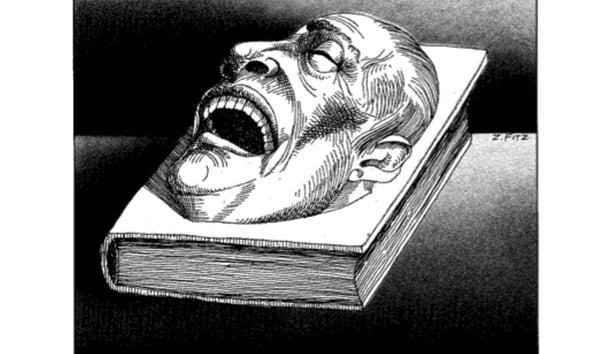“Aye, those fair living forms swam heavenly / To tunes forgotten. . . . “
—John Keats
One of life’s great joys is to come across a new work of literature that is likely to last far beyond any early assessment of its value. In the case of poetry, which chiefly concerns us here, it is to have known at first reading that, say, T.S. Eliot’s The Waste Land was at once a masterpiece of the age or that Robert Frost’s “Stopping by Woods on a Snowy Evening,” a lyric of only four stanzas, would become a classic on both sides of the Atlantic.
Many readers will receive a similar shock of recognition when they read Geoffrey Hill’s long poem of 100 quatrains, The Mystery of the Charity of Charles Péguy (the tide is a reference to Péguy’s great work Le Mystere de la Charité de Jeanne d’Arc).
It is almost too early for any serious appraisal to have appeared of Geoffrey Hill, whose work includes four volumes of poetry and a just-published volume of critical essays. Hill was born in Bromsgrove, Worcestershire, 1932, and currently lectures in English literature at the University of Cambridge. He is known in this country, of course, but not widely enough or with anything like the recognition he deserves.
One of the few American critics to discuss Hill is Harold Bloom. Bloom’s esoteric and highly idiosyncratic approach to poetry may say more about Bloom than Hill. For instance. Bloom selects for study the two extremely convoluted sonnets called “Annunciations” and practically derives from them the inference that Hill is the modern laureate of Gnosticism, and so on.
Whatever Hill’s religious convictions may be, he writes within a Catholic tradition which includes estrangement. In any case, though Hill seems neither comfortable nor pious in the ancient faith, he is nevertheless immersed in the knowledge of its sacraments and liturgy. As far as prosody is concerned, no one since Hopkins has packed the English line with such compression and energy of language. In cogency is liberation. It is in this sense, I think, that Hill revivifies the language at a time when its devaluation is everywhere apparent.
In his earliest and still very powerful work (some few items of which he curiously disavows). Hill seems to have favored the quatrain in four-stress lines as his chief unit of expression. He has also written some of the finest—and, to say it outright, beautiful—sonnets of our time. Hill then temporarily departed from strict form, which, in the essays he calls the use of “atonement” in artmaking, to compose the great “Mercian Hymns.” Prosaic in form but charged with poetry in language and imagery, these autobiographical segments run parallel to a recreation of British prehistory and may remind us of the work of David Jones in The Anathemata (1952). But the sequence by Hill is probably the masterpiece that Harold Bloom claims it to be.
As Bloom predicted, Geoffrey Hill has returned to the “tighter mode” of the earlier poetry and especially as now exemplified in The Mystery of the Charity of Charles Péguy. The 100 quatrains are in five-stress lines and obliquely rhymed in the main. The critical function at this time can only be to point at the complete poem itself and thus resist the temptation to quote it at length. Péguy, of course, was the French Catholic intellectual of peasant stock who was killed “on the first day of the first Battle of the Marne in September 1914.” Hill perceives him as a modern hero in the complex tragedy which would become known as the Dreyfus Affair, and the poem in general is Hill’s homage to the triumph of Péguy’s life of defeat, as he calls it, and which recognizes him as one of the great souls and prophetic intelligences of our century.
A critic writing in the British periodical Encounter has rated Hill’s collection of literary essays, The Lords of Limit, as the most important first book of criticism by a major English poet since T.S. Eliot’s The Sacred Wood (1920). Like his poetry. Hill’s essays are packed with originally turned ideas and considerable learning. This learning is so wide-ranging, in fact, that some 30 pages of reference notes are required at the back of the book. There are marvelous essays that deal with Robert Southwell, Jonathan Swift, Ben Jonson, Shakespeare, Gerard Mauley Hopkins, and John Crowe Ransom. The essays would be worth reading if only because they provide insights into that intricate life of the poet’s mind. In any event, readers in the English poetic tradition had better realize at once that in Geoffrey Hill we have a significant poet on our hands, one whose works have already distinguished him from a host of more fashionable but lesser talents.
[The Mystery of the Charity of Charles Péguy, by Geoffrey Hill; Oxford University Press; New York]
[The Lords of Limit: Essays on Literature and Ideas, by Geoffrey Hill; Oxford University Press; New York]

Leave a Reply